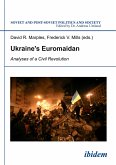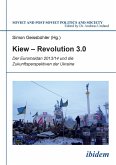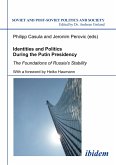The papers presented in this volume analyze the civil uprising known as Euromaidan that began in central Kyiv in late November 2013, when the Ukrainian president Viktor Yanukovych opted not to sign an Association Agreement with the European Union, and continued over the following months. The topics include the motivations and expectations of protesters, organized crime, nationalism, gender issues, mass media, the Russian language, and the impact of Euromaidan on Ukrainian politics as well as on the EU, Russia, and Belarus. The goal of the book is less to offer a definitive account than one that represents a variety of aspects of a mass movement that captivated world attention and led to the downfall of the Yanukovych presidency. The authors comprise well known and younger scholars who work on contemporary Ukraine and its neighbors.
Bitte wählen Sie Ihr Anliegen aus.
Rechnungen
Retourenschein anfordern
Bestellstatus
Storno








